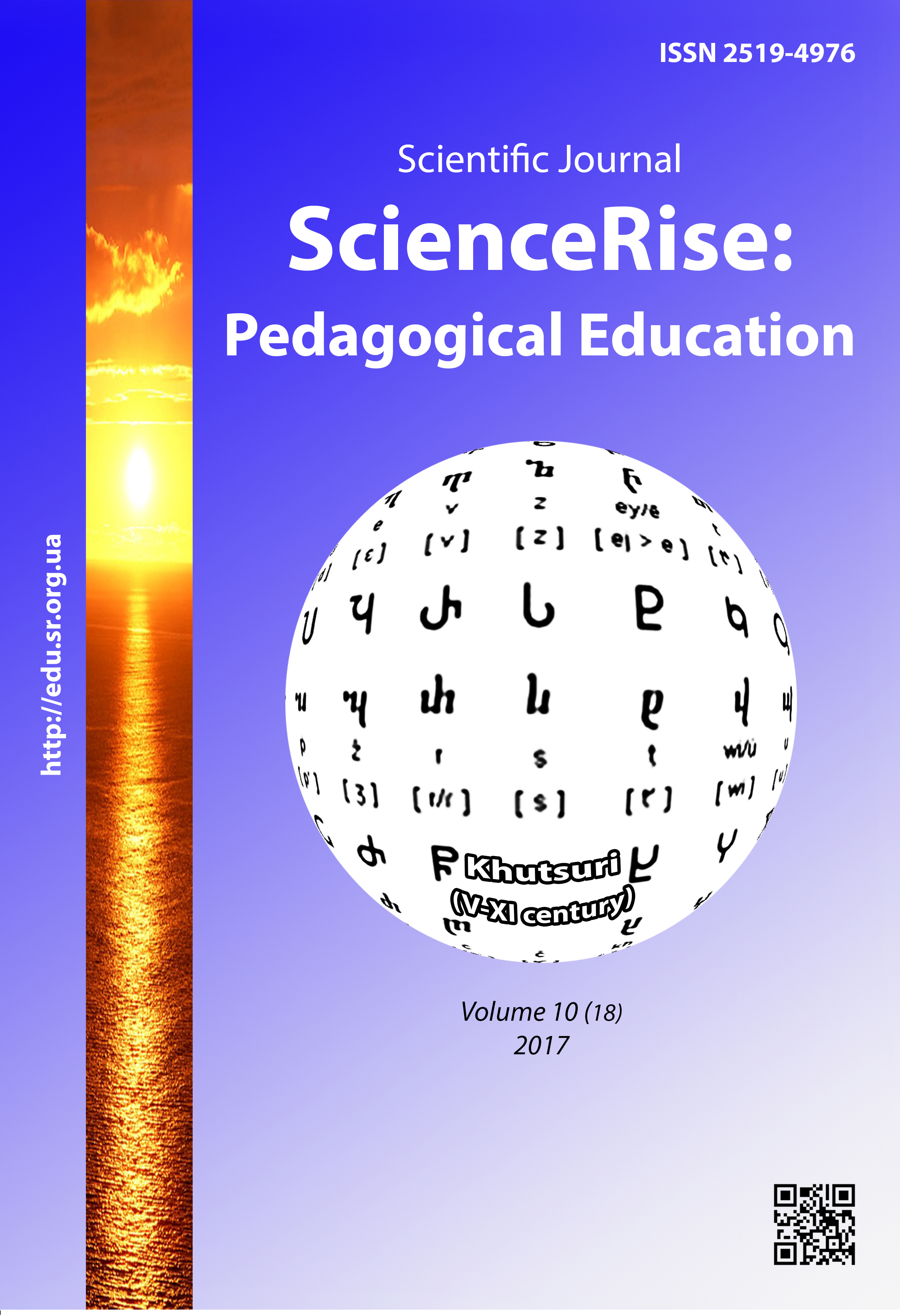Features of implementation of the pedagogical model of overcoming mass media negative influence on the process of adolescents’ socialization
DOI:
https://doi.org/10.15587/2519-4984.2017.112992Keywords:
mass media, socialization, adolescents, critical attitude, pedagogical model, componentsAbstract
The aim of the study is the theoretical substantiation of the pedagogical model of overcoming the mass media negative influence on socialization. The main task of the scientific search is a separation of social-pedagogic conditions of its minimization, determination of main principles of organization of the social teacher’s work with adolescents, description of main structural elements of the model. The work substantiates the value of critical attitude of adolescents to mass media as a factor of overcoming its negative influence on adolescents’ socialization. Social-pedagogical conditions were determined as: informing adolescents, their parents and teachers about negative results of mass media influence; formation of adolescents’ critical attitude of mass media; actualization of common human values in the adolescents’ value system and favoring the development of their communicative abilities and skills. There are separated the criteria of formation of critical attitude to mass media (intellectual, assessment-value and practical-activity). The elaborated model reflects the interconnection of such components of the program of formation of critical attitude to mass media as purposeful, organizational, content and technological
References
- Akimov, S. K. (2014). Psikholohycheskye osobennosti internet-addiktivnykh izmeneniy v strukture lichnosti [Psychological peculiarities of internet-addictive changes in personality structure]. Kharkiv, 189.
- Petrunko, O. V. (2010). Dity i media: sotsializatsiia v ahresyvnomu media seredovyshchi [Children and media: socialization in aggressive media environment]. Poltava: TOV NVP «Ukrpromtorhservis», 480.
- Korol, L. M., Maksymets, S. M. (2014). Psykholohichni chynnyky vplyvu ZMI na formuvannia osobystosti suchasnoi molodi [Psychological factors of mass-media influence on the modern youth personality development]. Science and Education, 5, 157–161.
- Leshchuk, H. (2014). Vplyv zasobiv masovoi informatsii na protses sotsializatsii pidlitkiv [Influence of mass-media on the process of adolescence socialization]. Youth and market, 3 (110), 76–80.
- Volkivska, D. A. (2016). Rozvytok liderskoho potentsialu studentskoho aktyvu v universytetskomu seredovyshchi [Development of the student’s assets leadership potential in the university environment]. Kyiv, 455.
- Serheieva, K. M. (2016). Profilaktyka ahresyvnoi povedinky pidlitkiv u tsentrakh sotsialno-psykholohichnoi reabilitatsii [Prevention of aggressive behavior of adolescents in centers of social and psychological rehabilitation]. Kyivskyi universytet im. B. Hrinchenka. Kyiv, 20.
- Ne potony v informatsiinomu doshchi. Navchannia mediahramotnosti hromadian [Do not sink in the information rain. Citizen’s medialiteracy education] (2016). Akademiia ukrainskoi presy. Available at: http://www.aup.com.ua/posibnik-dlya-treneriv-ne-potoni-v-infor/
- Bakka, T., Burim, O., Volosheniuk, O., Yevtushenko, R., Meleshchenko, T., Mokrohuz, O.; Ivanov, V., Volosheniuk, O. (Eds.) (2016). Mediahramotnist ta krytychne myslennia na urokakh suspilstvoznavstva [Media literacy and critical thinking on the social science classes]. Kyiv: TsVP, AUP, 243.
- Vachkov, Y. V. (2001). Osnovy tekhnolohiy hruppovoho treninha. Psykhotekhniky [The basics of group training technology. Psychotechniques]. Moscow: Os’-89, 224.
- Huesmann, L. R., Moise-Titus, J., Podolski, C.-L., Eron, L. D. (2003). Longitudinal Relations Between Children’s Exposure to TV Violence and Their Aggressive and Violent Behavior in Young Adulthood: 1977–1992. Developmental Psychology, 39 (2), 201–221. Available at: http://www.apa.org/pubs/journals/releases/dev-392201.pdf doi: 10.1037/0012-1649.39.2.201
Downloads
Published
How to Cite
Issue
Section
License
Copyright (c) 2017 Yana Shuhailo

This work is licensed under a Creative Commons Attribution 4.0 International License.
Our journal abides by the Creative Commons CC BY copyright rights and permissions for open access journals.
Authors, who are published in this journal, agree to the following conditions:
1. The authors reserve the right to authorship of the work and pass the first publication right of this work to the journal under the terms of a Creative Commons CC BY, which allows others to freely distribute the published research with the obligatory reference to the authors of the original work and the first publication of the work in this journal.
2. The authors have the right to conclude separate supplement agreements that relate to non-exclusive work distribution in the form in which it has been published by the journal (for example, to upload the work to the online storage of the journal or publish it as part of a monograph), provided that the reference to the first publication of the work in this journal is included.







